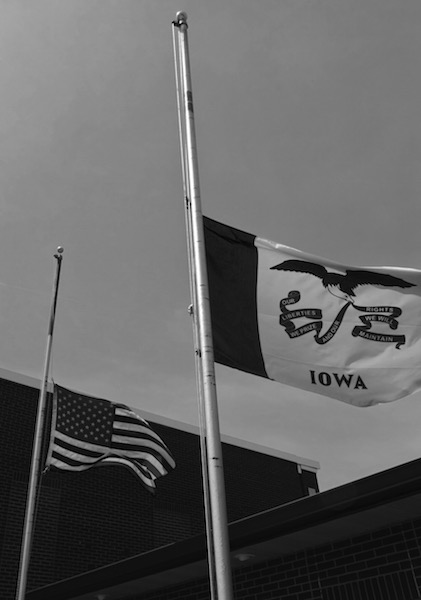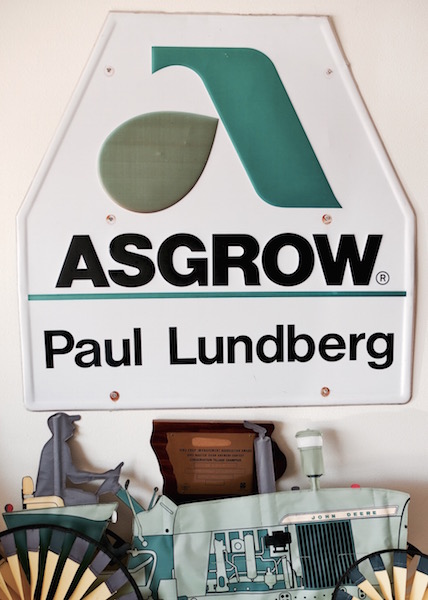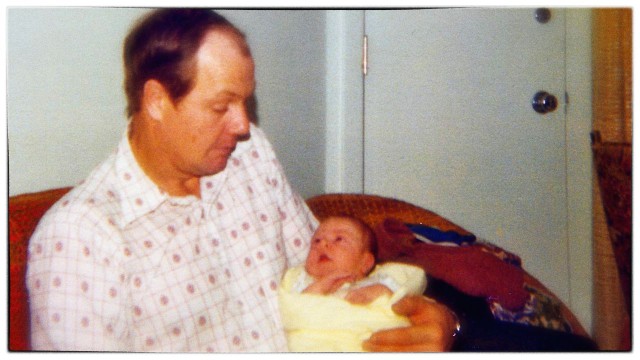

It was almost a year ago that I had a days-old newborn baby and her mother at home, and still hadn’t really processed the death of my grandfather the day before her birth. She was a couple of weeks early upon arrival; a timely reminder of the way we are born, take our first breath of air, only to learn that someday we’ll take our last. Her arrival was a very welcome diversion from the hard work of mourning. — Emory, on 2013-05-09
I don’t remember much of that caffeine and Adderall-fueled drive. I had just seen him what seemed like a few short weeks before in hospice, where he was under the excellent care of the men and women who have one of the most difficult careers I can possibly imagine. My wife and I visited him, my grandmother, and one of my cousins. Other people came to visit him while we were there; other people of his generation. Mostly the old women that always confused me for one of his three sons. I held his hand and showed him pictures on my iPad, and he’d squeeze my hand, I’d squeeze back, and mostly he just listened to all of us fuss over him lying in his bed with a smirk on his face and it was often hard to hear him when he spoke. He looked thirsty, and tired.
There was a time when we were briefly alone and like a lot of times alone with my grandfather, we didn’t exchange many words. I could tell he was frustrated to be in his current state, being confined or limited wasn’t something he tolerated very well. A lifetime spent up before dawn and working on his farm and making pancakes for his grandkids on Saturday mornings only to get back on his combine or tractor or pickup truck. He was a man who had responsibilities and obligations. People relied on him and he was absolutely reliable.
“Are you OK?” I asked. It was a stupid question, and I felt embarassed for even asking. He shifted in his bed, pillows strategically stuffed under limbs. He squeezed my hand and closed his eyes. He whispered something that I couldn’t hear clearly. My grandfather wasn’t someone who showed a lot of emotion, and I don’t think I ever saw him shed a tear his entire life. He only raised his voice at me once that I can recall. Every time I imagine his face, he is looking serious reading a newspaper, smiling, or laughing.
I was alone for the drive to his funeral, one moment I was perfectly fine and the next I’d be yelling and crying. I was running late, and would arrive at the funeral moments before the service started, joining my family after walking past aisles of people, most of whom I knew by face if not by name. My grandparents lived in a small town in Iowa, and they have lived there a long time.
During the service people spoke about my grandfather. My father euologized him in a way that I think he would have appreciated and my aunts, uncles, and grandmother laughed, cried, and whispered comforting things to one another along with my sisters and cousins. One thing that kept coming into my head while hearing people talk about him was that my grandfather was a different man for different people.
For example, I never thought of my grandfather as an especially pious man, but the pastor of their church spoke at length about his faith in a way that I couldn’t appreciate fully because that wasn’t something he ever expressed to me. Part of me was a little irritated by this, and I couldn’t help myself from feeling like this was a not-too-subtle manipulation of a flock by its’ shepard; yet another part of me knew that so many of the people around me shared that and would find comfort in it even if I didn’t know that part of my grandfather very well.
My step-mother sang, her voice was comforting and reminded me of my childhood, bringing me back to a time where we lived in a neighboring town. She was often at her piano, playing a song and rehearsing her song for that day’s service while lying on the floor in the living room, watching tiny airborne motes of dust drift between beams of sunlight coming in through the window. I was always excited to see my grandparents, even if it meant going to church and sitting in the pews quietly. 1
While walking out of the service, my shoulders tense, with the folded bulletin chronicling his life of service in my hands, I started wondering about my grandfather and how our lives are reflected in the people around us differently. His was the curious and studious mind of a farmer, Marine, husband, father, and grandfather, and I think it’s possible that the parts of himself that he expressed to all of us were harmonized by our own tuning forks. Our antennas that we keep carefully calibrated for one another will never get the same broadcast as another person. Our eyes and ears and our very atoms reflect some of the signal away and absorb the rest.
I never knew my Grampa when he was a younger man. I only knew him as my Grampa Lundberg, and my birth was when he received that designation. So, much like my daughter is shaping me into a father, I feel like my relationship with him may have carried some changes in him; while I grew up and he grew old.

Over the years of my life there are a lot things about my grandfather that I think are not unique to me. If I do think of him as a different man to different people, there was a common theme to all of them — common qualities and a compass that directed him throughout his life.
When I think about my Grampa, and these common qualities, I am always first reminded that he was respectful and courteous. I don’t know that I ever heard him speak ill of anyone, and he seemed always willing to give someone a chance when he had reason not to. I never knew him to get involved in things where he wasn’t wanted, and he was a very honorable man with the highest integrity. I don’t know that he ever told a lie, and like many people of his generation it’s possible that and not speaking ill he would rather not say anything at all.
Cautious and conscientious, he told me that his first speeding ticket was when he was in his fifties.2 There was a time when I rode back to Iowa from Minnesota with him, my grandmother, and one of my aunts during a snow storm, and a car behind us slid into the rear bumper of his Crown Victoria. The light impact sent the rear of the car out from under us, and we spun in one or two circles as I watched the world rotate around me in the window of the back seat. He regained control of the car, my grandmother was asking us if we were all alright, and my grandfather pulled onto the shoulder of Interstate 35 and calmly got out to talk to the other driver. I don’t remember him saying a single word during the incident and just thought my grandfather was so cool and under control. It could have been a terrible thing; an accident on an interstate highway in the winter at night. His confidence and calm quieted me, I wasn’t scared even when I was certain we were headed for a ditch or an oncoming car.
He was a modest man. I think in the 35 years I knew him he owned three cars and two different trucks. One of my favorite memories of him is when he got his second truck, a small Ford Ranger pickup. When he bought the truck it had a pinstripe and the words “sport” on the side, and that week he removed the stripe and the “sport” decal from the door, and with a smirk on his face, telling me that he “didn’t want people to think he was showing off.” 3
My father is a stock broker, and works inside of that layer of abstraction with goods and services using shares of companies, financial instruments, and funds in a way that I don’t really understand at all. One thing I did learn very early however was the value of livestock and the direct relationships of a bushel of corn or an animal to his business. He was about as close to the market as you can get as far as I’m concerned; my entire career is spent in a non-physical world where my contributions or achievements aren’t measured in the same way. When I have a long day at work, it’s usually from talking to people, drawing pictures, and pushing buttons to move characters on screens and inside of databases.
The only time I remember my grandfather being cross with me, cross enough to raise his voice, was one winter when I was five or six years old. I walked with him to where the hogs were being kept on the farm, and he hopped the fence to feed them, and I made a loud noise or something and I startled one of the giant beasts. My shenanigans were unexpected and they moved too quickly to get away from the screetching boy, and slipped and fell on some ice.
My Grampa was visibly upset, and hollored at me to step back from the fence. He walked across the ice in his big rubber boots and lifted that big animal up onto its feet and made sure that there were no injuries. “A pig with a broken leg doesn’t do me much good,” and I remember apologizing and being scared for the pig. Over the years I’d hold a lot of piglets in my arms, even bottle fed a couple. I knew they weren’t pets, but that was the first time I think that I put it together that the reason they were on the farm wasn’t because of a foster program to give the grandfathers of the world a fun hobby. It was business.
Waking up to the smell of bacon and pancakes on Saturday mornings further drove the point home, a nearly one-to-one relationship. He made fantastic pancakes — as a boy I remember thinking they were huge but it’s entirely possible they weren’t extraordinarily large, but when I remember them they were the size of the plate they were served on, and there was also french toast. I didn’t really understand french toast; the first time I made some with him I did it by putting a slice of bread in the microwave and then covering it with maple syrup. My grandmother defended my creation when others scoffed, my Grampa laughed and told me that it kind of looked like french toast. I made amends by making him proper french toast nearly 30 years later, with turkey bacon because his doctors didn’t want him to have too much sodium. I had half a mind to enable him in a rebellion against the tyranny of modern medicine by giving him the good stuff, but couldn’t handle the prospect of my grandmother finding out.
He was almost always reading. He loved old war movies like Retreat Hell, and watching Gunsmoke. He was a very conservative and self-reliant man, and was always willing to hear an opposing point of view. He would sometimes playfully dispute an opposing claim, but he would just as often listen and quietly consider what you had to say. It’s possible that he still disagreed, but he often opted to keep it to himself and not belabor the point.
I loved my Grampa, and though I left his funeral wondering if the Paul I knew was the same man everybody else had known, I knew without a doubt that I admired him, respected him, loved him, and that he was a good man. One of the very best.
You can give money to help other families pay for hospice care for their loved ones and to help support the staff that work there through Employee Relief programs and scholarship awards for nursing students; my grandfather was at Mercy Hospice in Johnston and I can’t say enough nice things about the people who work there. If you have been fortunate enough to have a hospice facility care for a loved one, consider showing them some support.
As if I could ever sit anywhere quietly. ↩
I believe him, he usually had my Grandmother telling him to slow down even if he sent the needle one notch above the speed limit. ↩
He was also fond of getting down on his knees in the middle of a field for passing drivers to gawk at just how tall his corn or soybeans were, so you can see he was modest, but not to a fault. ↩